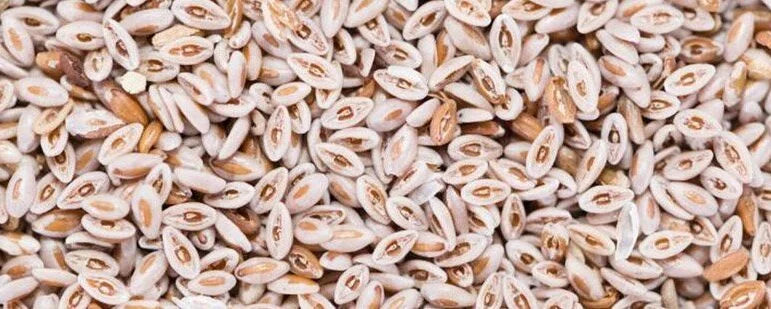
Psyllium husk for Dogs
Plantago ovata
Psyllium is a form of soluble fibre derived from the seeds of the Plantago ovata plant. It is widely used in supplements to support digestive health due to its ability to absorb water and promote regular bowel movements. For dogs, psyllium can be particularly helpful in managing both constipation and diarrhoea, and it supports overall gut health by regulating digestion and improving stool consistency.
Main Benefits of Psyllium for Dogs
1. Promotes Regular Bowel Movements
Psyllium is rich in soluble fibre, which absorbs water in the digestive tract, helping to add bulk to the stool. This makes it easier for dogs to pass stool regularly, reducing the risk of constipation. It can also help soften hard stools, providing relief for dogs with irregular or difficult bowel movements.
2. Helps with Diarrhoea
In addition to its ability to prevent constipation, psyllium is effective at managing diarrhoea in dogs. The soluble fibre in psyllium absorbs excess water in the intestines, helping to firm up loose stools. This dual action makes psyllium a useful remedy for dogs suffering from both diarrhoea and constipation, helping to regulate their digestive system and restore balance.
3. Supports Gut Health
Psyllium acts as a prebiotic, feeding the beneficial bacteria in your dog’s gut. These good bacteria play a key role in maintaining a healthy gut environment and promoting smooth digestion. By fostering the growth of these bacteria, psyllium helps improve digestive function and supports overall gut health.
4. Assists in Weight Management
The high fibre content of psyllium can help dogs feel fuller for longer periods, which may assist with weight management. By slowing down digestion and promoting satiety, psyllium can help reduce overeating and aid in maintaining a healthy weight, especially in dogs prone to weight gain.
5. Improves Nutrient Absorption
Psyllium helps slow the digestive process, allowing more time for nutrient absorption in the intestines. This ensures that your dog’s body absorbs essential vitamins and minerals more effectively, supporting overall health. It’s particularly beneficial for dogs with digestive disorders that may interfere with nutrient absorption.
6. Supports Anal Gland Health
Psyllium’s ability to bulk up the stool can help dogs with anal gland issues. By creating firmer stools, psyllium helps express the anal glands naturally during bowel movements, reducing the risk of impacted glands and the discomfort associated with this condition.
Why We Include Psyllium in Our Supplements
We include psyllium in our supplements to support digestive health, promote regular bowel movements, and manage both constipation and diarrhoea. Psyllium’s ability to regulate digestion makes it particularly beneficial for dogs with sensitive stomachs, irregular bowel movements, or those needing extra digestive support. Additionally, its role in improving nutrient absorption and promoting gut health makes it an essential ingredient for overall well-being.
How We Optimise the Dosage of Psyllium
The dosage of psyllium in our supplements is carefully calculated to ensure that your dog receives the correct amount based on their size, age, and digestive needs. We work with experts in canine nutrition to ensure that psyllium is included in a way that promotes healthy digestion without causing any gastrointestinal upset. This balanced dosage provides digestive support while preventing issues such as bloating or discomfort.
The Bottom Line
Psyllium is a highly effective soluble fibre that supports digestive health, promotes regular bowel movements, and helps manage both constipation and diarrhoea in dogs. Its ability to regulate digestion, improve stool consistency, and support gut health makes it an essential part of maintaining your dog’s overall well-being. Including psyllium in your dog’s diet can help keep their digestive system healthy and functioning smoothly.
Frequent Questions
1. How can I tell if my dog needs psyllium?
Dogs with constipation, diarrhoea, or irregular bowel movements may benefit from psyllium. It is also helpful for dogs with sensitive stomachs or those experiencing anal gland issues. If your dog shows signs of digestive discomfort or irregular stools, adding psyllium to their diet can help.
2. Can my dog have too much psyllium?
While psyllium is generally safe, giving too much can cause bloating, gas, or abdominal discomfort. It’s important to follow the recommended dosage based on your dog’s size and weight. If your dog experiences any digestive upset, reduce the amount of psyllium and consult your vet.
3. Is psyllium safe for long-term use?
Yes, psyllium is safe for long-term use, especially for maintaining regular bowel movements and gut health. Regular use can help prevent constipation and diarrhoea while promoting smooth digestion over time.
Psyllium husk
contained in

